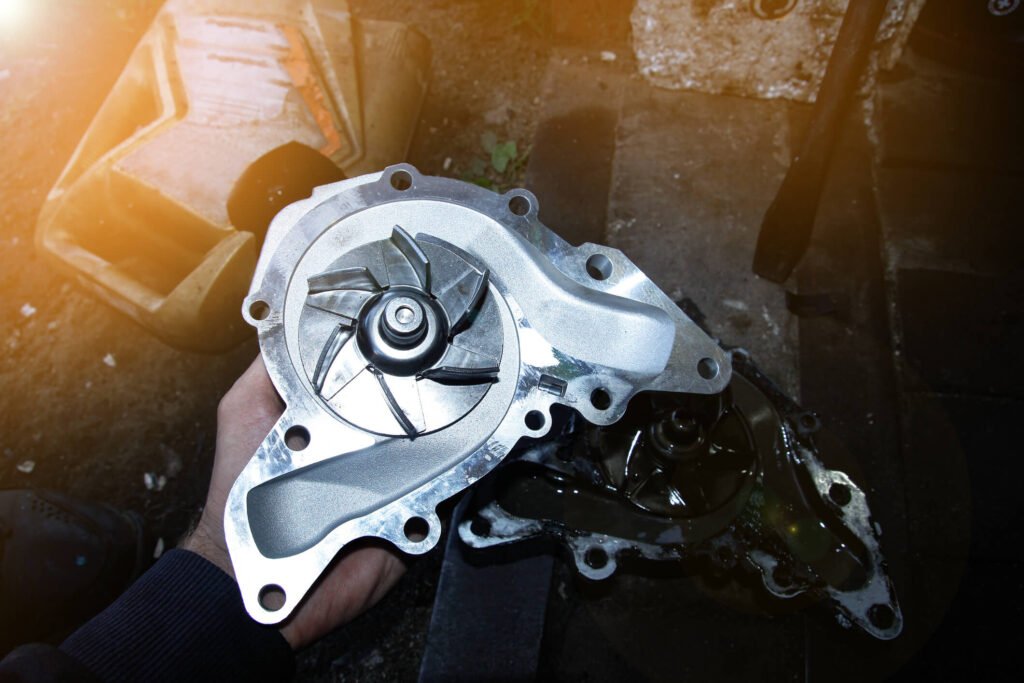Introduction
When it comes to automotive reliability, one of the most significant concerns for car owners is the longevity and durability of their vehicle’s engine. For Lincoln owners, a common question that arises is, “Are Lincoln Engines All Subject to Water Pump Destruction?” This concern stems from reports and discussions among car enthusiasts and experts about the potential vulnerabilities in some Lincoln engine designs, particularly concerning the water pump. In this blog, we will delve into this topic, exploring the specifics of Lincoln engines, the role of the water pump, and whether all Lincoln engines are indeed at risk of water pump failure. This article is crafted to be SEO-friendly, easy to understand, and comprehensive, providing you with the insights you need to make informed decisions about your Lincoln vehicle.
Understanding the Role of the Water Pump in Lincoln Engines
Before we address the question “Are Lincoln Engines All Subject to Water Pump Destruction,” it’s essential to understand the role of the water pump in an engine. The water pump is a critical component of a vehicle’s cooling system, responsible for circulating coolant through the engine block, hoses, and radiator. This circulation helps to maintain the engine at an optimal operating temperature, preventing overheating and ensuring efficient performance.
In Lincoln engines, as with most other engines, the water pump is typically driven by the engine’s timing chain or belt. This means that it operates in sync with the engine’s other components, ensuring a consistent flow of coolant. However, if the water pump fails, it can lead to severe engine damage due to overheating, which is why the reliability of the water pump is a significant concern for vehicle owners.
Are Lincoln Engines All Subject to Water Pump Destruction?
The question “Are Lincoln Engines All Subject to Water Pump Destruction” arises from the experiences of some Lincoln owners who have encountered water pump failures in their vehicles. While it’s true that certain Lincoln engines have been associated with water pump issues, it’s important to note that not all Lincoln engines are prone to this problem.
1. The Lincoln 3.5L and 3.7L V6 Engines

One of the most commonly discussed engines regarding water pump issues is the 3.5L V6 engine, used in several Lincoln models, including the Lincoln MKX, Lincoln MKS, and Lincoln MKT. This engine, which shares its design with the Ford Duratec engine family, has been reported to experience water pump failures due to its internal water pump design. Unlike traditional water pumps, which are mounted externally and easily accessible, the water pump in these engines is located inside the engine block, driven by the timing chain.
If the internal water pump fails, it can lead to coolant mixing with engine oil, resulting in catastrophic engine damage. The cost of repairing this issue can be significant, as it often requires extensive labor to replace the water pump and address any resulting engine damage.
2. Other Lincoln Engines
While the 3.5L and 3.7L V6 engines have garnered attention for their water pump design, not all Lincoln engines share this vulnerability. For example, the Lincoln 2.0L EcoBoost engine, found in models like the Lincoln MKC and Lincoln MKZ, uses a more conventional water pump design that is less prone to catastrophic failure. Similarly, the 5.0L V8 engine in the Lincoln Navigator has not been commonly associated with water pump issues.
Therefore, the answer to “Are Lincoln Engines All Subject to Water Pump Destruction” is no; the risk is not universal across all Lincoln engines. The potential for water pump failure is more pronounced in specific engine designs, particularly those with internally mounted water pumps.
Signs of Water Pump Failure in Lincoln Engines
Understanding the signs of water pump failure can help Lincoln owners take proactive steps to address the issue before it leads to severe engine damage. Here are some common indicators that your water pump may be failing:
1. Coolant Leaks
One of the most obvious signs of a failing water pump is a coolant leak. If you notice coolant puddling under your vehicle or see a drop in your coolant levels without an apparent reason, it could be a sign that the water pump is leaking.
2. Overheating Engine
An overheating engine is a critical warning sign that something is wrong with the cooling system. If your engine temperature gauge is consistently running higher than normal, or if your engine is overheating, it could indicate that the water pump is not circulating coolant effectively.
3. Whining or Squealing Noises
A failing water pump can produce unusual noises, such as whining or squealing, especially if the pump’s bearings are worn. These noises may become more pronounced as the engine speed increases.
4. Steam from the Radiator
If you notice steam coming from under the hood, particularly from the radiator, it could be a sign that the engine is overheating due to a failing water pump. This is a serious issue that requires immediate attention.
5. Engine Oil Contamination
In engines with internal water pumps, a failure can lead to coolant mixing with engine oil. If you notice a milky or frothy appearance in your engine oil, it could indicate that coolant has contaminated the oil, potentially due to a water pump failure.
Preventive Measures and Maintenance Tips

To reduce the risk of water pump failure in your Lincoln engine, regular maintenance and early detection are crucial. Here are some preventive measures and maintenance tips to keep your engine in good condition:
1. Regular Coolant Checks
Ensure that your coolant levels are consistently at the appropriate level and that the coolant is clean and free of contaminants. Regularly checking your coolant levels can help you detect leaks or other issues early on.
2. Scheduled Maintenance
Follow your vehicle’s recommended maintenance schedule, including regular inspections of the cooling system. During these inspections, your mechanic can check for signs of wear or leaks in the water pump and other cooling system components.
3. Replace the Water Pump Proactively
If your Lincoln is equipped with an engine known for water pump issues, consider replacing the water pump proactively before it fails. While this may seem like an unnecessary expense, it can save you from more costly repairs down the line.
4. Use High-Quality Coolant
Using the correct type of coolant for your vehicle is essential. High-quality coolant not only helps regulate engine temperature but also contains additives that protect against corrosion and wear in the cooling system.
5. Be Aware of Recalls and Technical Service Bulletins
Stay informed about any recalls or technical service bulletins (TSBs) related to your vehicle’s engine. Manufacturers often issue TSBs to address common issues, and in some cases, they may offer extended warranties or repairs for known problems.
The Cost of Water Pump Replacement in Lincoln Engines
The cost of replacing a water pump in a Lincoln engine can vary widely depending on the model, engine type, and whether the water pump is internal or external. For engines with an internal water pump, the replacement process is more labor-intensive and, therefore, more expensive. On average, the cost of replacing an internal water pump in a Lincoln engine can range from $1,500 to $3,000 or more, depending on the extent of the work required.
For engines with an external water pump, the replacement is generally less costly, with prices ranging from $300 to $700, depending on the make and model of the vehicle. However, it’s essential to consider the potential long-term costs of not addressing a failing water pump, as engine damage from overheating can lead to even more expensive repairs or the need for a complete engine replacement.
What to Do If Your Water Pump Fails

If you suspect that your Lincoln engine’s water pump has failed, it’s crucial to take immediate action to prevent further damage. Here are the steps you should take:
1. Stop Driving
If your engine is overheating or you notice signs of water pump failure, stop driving your vehicle immediately. Continuing to drive with a failing water pump can cause severe engine damage.
2. Check Coolant Levels
If it’s safe to do so, check your coolant levels and top them off if necessary. However, if the coolant is leaking rapidly, topping it off may only be a temporary solution.
3. Contact a Professional Mechanic
Have your vehicle towed to a trusted mechanic for a thorough inspection. A professional will be able to diagnose the issue and determine whether the water pump needs to be replaced.
4. Consider Repair Options
If the water pump has indeed failed, discuss your repair options with your mechanic. Depending on the severity of the failure, you may need to replace the water pump, flush the cooling system, and address any related engine damage.
Conclusion
The question “Are Lincoln Engines All Subject to Water Pump Destruction?” is a valid concern for many Lincoln owners, particularly those with engines known for internal water pump designs. While not all Lincoln engines are at risk, understanding the specific vulnerabilities of your vehicle’s engine can help you take proactive steps to prevent water pump failure.
Regular maintenance, early detection of issues, and staying informed about your vehicle’s potential weaknesses are key to ensuring the longevity and reliability of your Lincoln engine. By following the tips and recommendations outlined in this blog, you can reduce the risk of water pump failure and keep your Lincoln running smoothly for years to come.
In the end, while some Lincoln engines may be more prone to water pump issues, being informed and proactive can make all the difference. Whether you’re a current Lincoln owner or considering purchasing one, understanding the potential risks and how to mitigate them is essential for making the best decision for your vehicle and your peace of mind.
